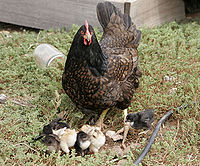Chicken
 From Conservapedia
From Conservapedia | Chicken | |
|---|---|

| |
| Scientific classification | |
| Kingdom Information | |
| Kingdom | Animalia |
| Phylum Information | |
| Phylum | Chordata |
| Class Information | |
| Class | Aves |
| Order Information | |
| Order | Galliformes |
| Family Information | |
| Family | Phasianidae |
| Genus Information | |
| Genus | Gallus |
| Species Information | |
| Species | G. gallus |
| Population statistics | |
The chicken (Gallus gallus) is a domesticated fowl that originated in either Southern Asia, or Vietnam. Due to its usage for both its meat and eggs, it rapidly spread all over the world when people domesticated the animal. Today, the chicken is the most widespread domesticated animal, with a population exceeding 24 billion as of 2003.
An adult hen (the female) generally lays as many as six eggs a week in production breeds, or as little as one or two a week in some hens. In general, the White Leghorn is used for white egg production, and the Rhode Island Red is used for brown egg production.
Dietwise, chickens are omnivores, often scratching for food. Some chickens eat lizards or other small reptiles, but usually eat worms or other smaller insects.
The lifespan of a healthy chicken generally goes to around six years. During this time, a hen can produce as many as 300 eggs a year. The egg laying capacity of a hen generally decreases as she gets older, usually around one year old.
A male chicken is referred to either as a rooster or a cock, and a young rooster is referred to as a cockerel. In general, a cockerel will start crowing at around 6 months old.
Most chickens are skittish animals, but if hand raised they can become extremely affectionate, even to the point of jumping on the person who raised them. Roosters, however, can turn aggressive for a variety of reasons, even to the point of injuring the person who raised them. In addition, many cities have passed laws restricting roosters because of their loud crowing.
As pets, chickens are generally easy to take care of with a minimum of care required. It is possible to have a hen or rooster that lives in your home, although defecation (which occurs about once every half hour) may make this more frustrating and messy than anything else. It is generally easiest to keep a chicken (or flock of chickens) in a coop.
Cultural associations[edit]
Culturally, in most English-speaking countries, chickens are associated with cowardice. It is unclear how this association began, or what behaviors exhibited by real-life chickens are considered to be cowardly; nonetheless, a reference to chickens is often found to be an effective way to mock a cowardly person, whether calling him or her "chicken", ostentatiously imitating a chicken, or making more complex quips such as that a cowardly proponent of evolution seems to have evolved into a chicken.
Chicken wings[edit]
References[edit]
↧ Download as ZWI file | Last modified: 02/04/2023 23:58:49 | 96 views
☰ Source: https://www.conservapedia.com/Chicken | License: CC BY-SA 3.0
 ZWI signed:
ZWI signed:
 KSF
KSF